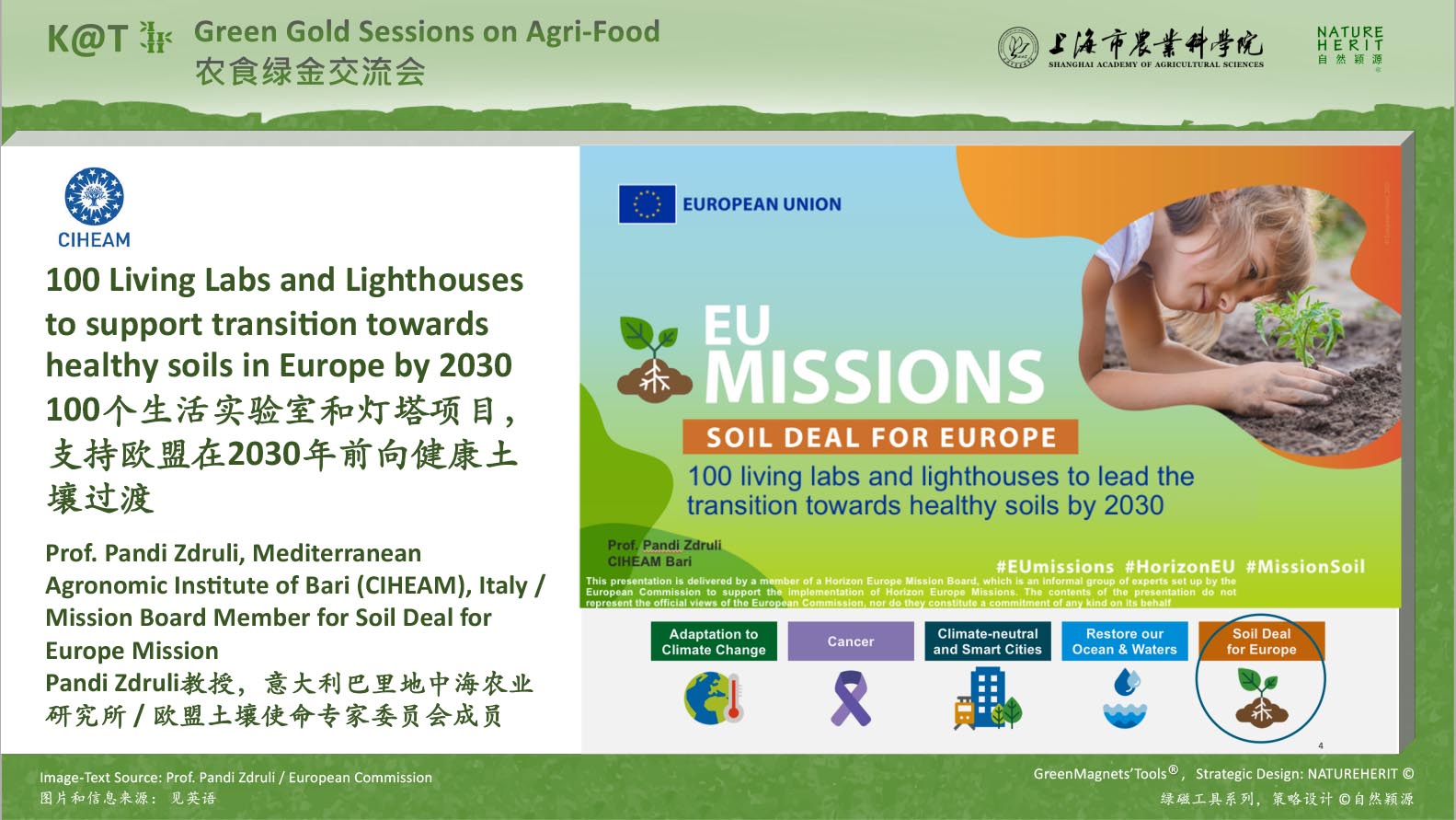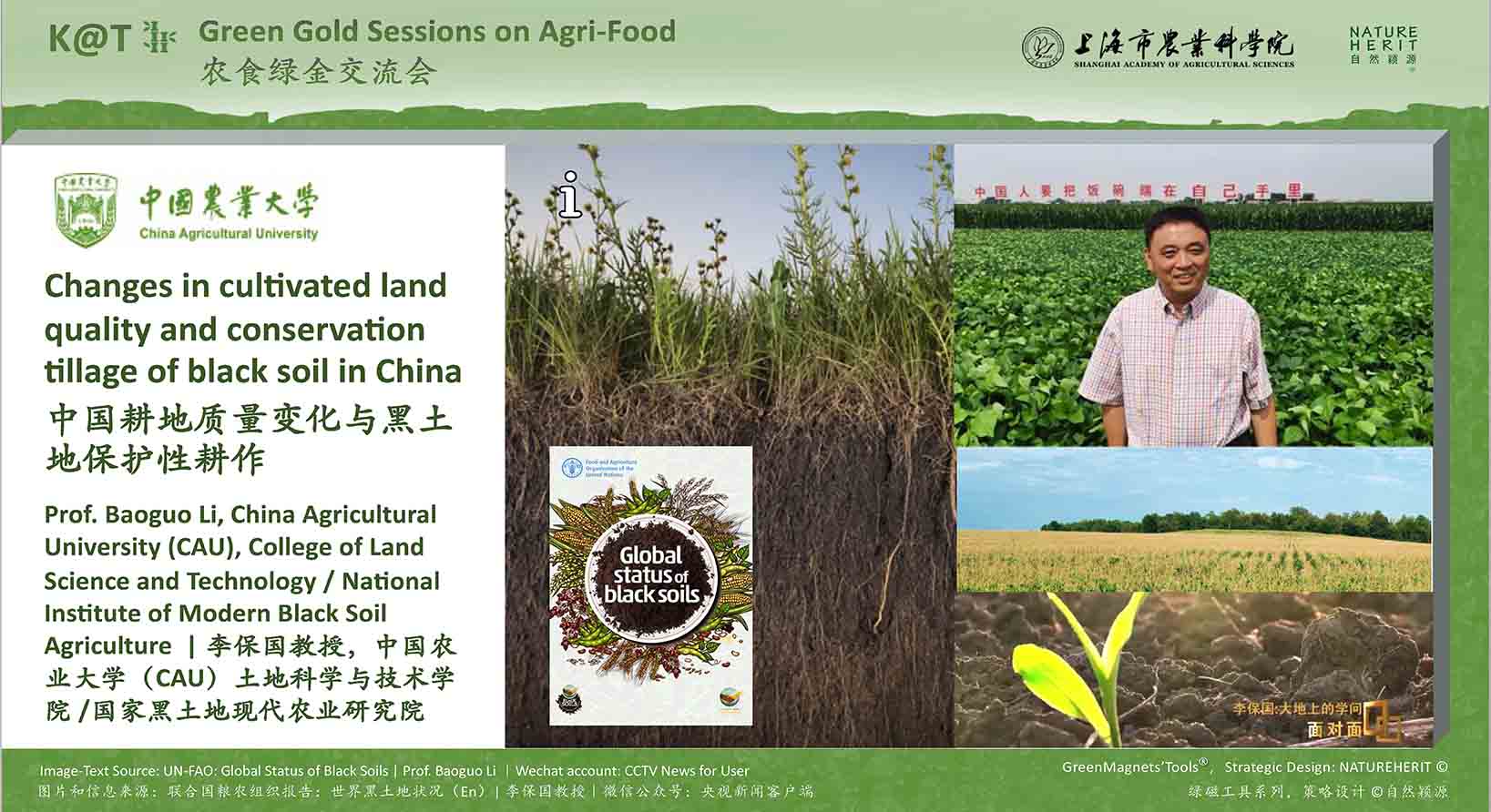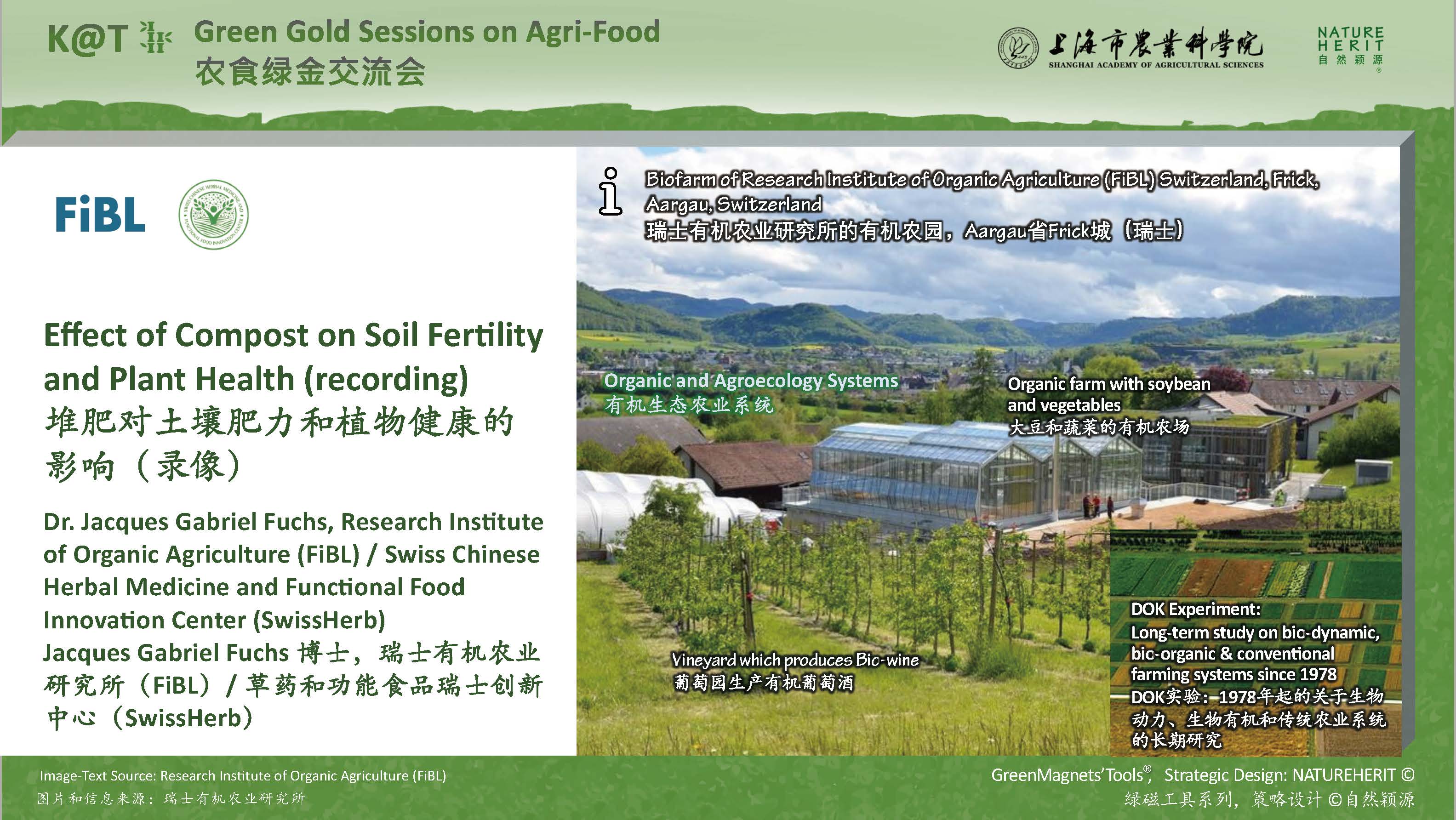GGS-AF 2023-IA: "Soil-Mountain-Forestry" | Presentation Summaries

Green Gold Sessions on Agri-Food 2023-I "Water-Soil▪Mountain-Forest▪Wetland" (Sustainable Water-Soil & Agro-Forestry Management Practices) Introduction
IA:“Soil-Mountain-Forestry”
❏ Prof. Pandi Zdruli, Mediterranean Agronomic Institute of Bari (CIHEAM), Italy / Mission Board Member for Soil Deal for Europe Mission
100 Living Labs and Lighthouses to support transition towards healthy soils in Europe by 2030
❏ Prof. Baoguo Li, College of Land Science and Technology, China Agricultural University (CAU-CLST) / National Institute of Modern Black Soil Agriculture
Changes in cultivated land quality and conser vation tillage of black soil in China
❏ Dr. Jacques Gabriel Fuchs, Research Institute of Organic Agriculture (FiBL) / Swiss Chinese Herbal Medicine and Functional Food Innovation Center (SwissHerb)
Effect of Compost on Soil Fertility and Plant Health (recording)
❏ Prof. Hanlin Zhang, Eco-Environmental Protection Research Institute, Shanghai Academy of Agricultural Sciences (SAAS-EEPRI)
Eco-efficient agricultural methods in Shanghai, enhancing yield quality & biodiversity
❏ Dr. Lakshmi Gopakumar, expert member for the Global Assessment of Soil Pollution, UN-FAO, Sree Narayana Guru Open University (SNGO), Kerala, India
Indicator-based soil assessment in home garden agroecosystems, case study from Kerala State, India
❏ Prof. Wang Yixiang, College of Carbon Neutrality, Zhejiang Agricultural & Forestry University (ZAFU-CCN)
Value assessment and realization of Gross Ecosystem Product (GEP) in mountain-forest regions -- Case study of Guimen Township, Shengzhou City, Zhejiang Province
Presentation video link: https://b23.tv/2uUtv3x
Prof. Pandi Zdruli from CIHEAM, Mediterranean Agronomic Institute of Bari, Italy, is a distinguished soil scientist and a Mission Board Member for Soil Deal for Europe Mission. He introduced the soil health issues in Europe and the Soil Mission by the European Commission that advises Horizon Europe R&I program 2022-2027, serving the EU Directives and comprehensive EU Green Deal policies, such as Farm to Fork Strategy, EU Biodiversity Strategy for 2030, Climate Adaptation and Forest Strategy, Zero Pollution Action Plan for air, water and soil, Organic Action Plan, Long term vision for rural areas, EU Soil Strategy for 2030 and Communication on sustainable carbon cycles.
Prof. Zdruli called on the expansion of exchanges and cooperation with the Living Labs and Lighthouse projects of EU with China, India and other countries, in the scope of technical R&D and regional innovation projects, in which farmers and farming companies on regional grounds should be included.
Q: The EU is piloting carbon farming based on key indicator systems such as the SOC (soil organic carbon) storage, while China is tests and advances various green transition measures (similar to the EU Green Deals). What would you recommend for the implementation of carbon farming and better use of technical solutions in regional development?
A: Carbon farming is fast expanding in Europe with very good perspectives. The programme depends on the farmer's involvement and decision to implement regenerative agriculture practices, such as minimum tillage, crop rotations, mulching, inclusion of organic manure and composting, that would accelerate the process of carbon sequestration in the soils. The private sector involvement is crucial for success and the regulatory framework should be in place to encourage and support carbon markets. At the end this is a win-win process for all and the society at large. The great efforts that China has done at the Loess Plateau by the reforestation programmes could be a good example where carbon sequestration can increase even in areas that were bare of any vegetation some years ago.
Q: How could key stakeholders and EU-China partnerships make a concrete next step, as in your "green gold suggestion"?
A: Just like the Sino-EU Panel on Land & Soil (SEPLS) was established by the Joint Research Centre (JRC) of the European Commission, we need to share, learn and convey messages on both sides of EU and China, that are easy and worth to communicate and distribute, to advance possible cooperation. We need to have farmers and farming companies to ensure impacts on the local ground. That is why the Living Lab mechanism has been set up, to improve and learn suitable technologies and solutions from one farm to another.
Presentation video link: https://b23.tv/mO371Hn
Prof. Baoguo Li from the College of Land Science and Technology, China Agricultural University (CAU) is a distinguished professor by the Ministry of Education of China, formerly served as the Vice Chairman of the Soil Science Society of China, fellow of the Soil Science Society of America, and American Society of Agronomy. He presented the changes in arable land quality and conservation tillage in China. As the "Professor of Black Soils", he laid out the severe image of black soils cultivation hazards in China. Although multiple environmental indicators in China have been alleviated in the past decade, intense utilization has still led to arable land quality decline and serious damage to the eco environment. Various regional hazards need better coordination and integration of land resource utilization actions.
Therefore, the first national Black Soils Protection Law in the world was recently set-up in China. The National Institute of Modern Black Soil Agriculture of CAU was set up as a "Chinese Living Lab" to build up capacity for new operative models and disseminate conservation agricultural practices on black soils with farmer cooperatives, technical innovators and societal players.
Q: What is your view on the prospects for protecting black soils and all agricultural land in China? And how could international exchanges play a role?
A: In order to overcome severe agri-food crisis and operational gaps, we need more high-quality international exchanges to understand global views on conservation agriculture and food production in all aspects, where we could involve more players and solutions to exchange in multiple languages, like the initiative of GGS-AF.
Presentation video link: https://b23.tv/gVIBPKA
Dr. Jacques Gabriel Fuchs is a renowned expert in composting for organic and eco farming at the Research Institute of Organic Agriculture (FiBL) and the Swiss Chinese Herbal Medicine and Functional Food Innovation Center (SwissHerb). For the first GGS-AF, he prepared a video presentation over the Effect of Compost on Soil Fertility and Plant Health, as he could not be online during the session. He shared professional info over composting production and quality control for organic farming in Switzerland and the EU.
"How does composting work in Switzerland for organic farming products and urban horticulture activities?" Dr. Fuchs started to explain to the public in the video presentation:
First of all, there are no fundamental differences between compost production for conventional and organic farming. Depending on the inputs to be processed (quantity and quality), the geographical location and the types of compost produced, people use different composting techniques used in Switzerland, such as field-side composting, on-site composting, hall composting and more.
Secondly, every composting facility dealing with organic waste must have a licence to operate issued by the authorities. These facilities are subject to annual checks on material flows (inputs and outputs) and regular analyses of the composts produced (nutrient content, heavy metal content, foreign matter content (plastics), etc.). They must also complete process control protocols for each batch of compost, proving that the material has been hygienized naturally. All processed organic residues must be on the government-issued list of authorized inputs. In Switzerland, for example, sewage and sludge are not permitted.
Generally speaking, all composts can be used in organic farming in Switzerland, as the authorized inputs are not problematic for organic farming. Any pesticides authorized in Switzerland that may be present in the inputs are broken down during the composting process).
In terms of compost quality, the only difference between conventional and organic farming concerns the content of undesirable matter from 2024 onwards (plastics: 0.1% of dry matter for conventional farming, and 0.05% for organic farming).
The use of compost is especially important for farmers with no livestock. It helps maintain the soil's humus content and ensures soil fertility. This is particularly important for intensive crops such as market vegetables.
Q: Prof. Pandi Zdruli from the Mission Board Member for Soil Deal for Europe Mission, the Soil Mission by the European Commission has introduced the targets until 2030: 25% of agricultural land under organic farming, overall use and risk reduction of chemical pesticides by 50% and fertilizer use reduction by at least 20%, nutrient loss reduction by at least 50%. What do you think about the viability of these targets?
A: With regard to the objectives mentioned by Pandi Zdruli, here's my personal assessment:1. 25% of agricultural land devoted to organic farming is achievable, provided the population is prepared to consume enough organic produce (which is more expensive than conventional produce). In the event of financial difficulties, many people first save on food expenses, which is a hindrance to the development of organic farming. It should also be pointed out that in Switzerland, "conventional" farming is actually integrated farming; it's a form of agriculture that lies somewhere between internationally recognized conventional farming and organic farming. As a result, the difference in quality between these products and those from organic farming is not as great as in other countries, such as China.
2. A drastic reduction in the use of pesticides is certainly possible, in particular with improved precision farming techniques and optimized strategies for using these products. In countries where restrictions are already in place (such as Switzerland with its integrated agriculture), the scope for reductions is obviously less than in countries with unrestricted intensive agricultural production.
3. The same applies to fertilizer savings. In Switzerland, all farmers must respect the fertilizer balance sheet, which means adjusting their fertilization to the elements leaving the plot with the harvest. It is clear, however, that in countries without such limits and where heavy over-fertilization is carried out, significant fertilizer savings are possible. In terms of nutrient losses, this is certainly strongly linked to over-fertilization aspects. However, savings in nutrient losses are also possible by optimizing fertilization strategies, in particular by fractioning inputs, and by using new precision farming methods that enable crops to be analyzed precisely, applying nutrients only to the parts of the plot that need them.
The conclusion of Dr. Fuchs is: Respect various ecosystem circulations with and without major crops; Ensure positive effects for organic farming or agroecology by composting products with good quality and correct application.
Presentation video link: https://b23.tv/j6KiFoU
Prof. Hanlin Zhang is from Eco-Environmental Protection Research Institute at the Shanghai Academy of Agricultural Sciences (SAAS-EEPRI). He was a visiting scholar at the Joint Laboratory of the Food and Agriculture Organization of the United Nations (FAO) and the International Atomic Energy Agency (IAEA). At the 1st Green Gold Sessions on Agri-Food (GGS-AF 2023-I) “Water-Soil ▪ Mountain-Forest ▪ Wetland”, he gave an introduction over eco-efficient mixed farming models in Shanghai - the Vegetable-Earthworm-Eel (VEE) Circular Planting-Breeding Model (https://www.nature.com/articles/s41598-018-27923-y) and In Situ Treatment of Earthworm Combined with Straw Returning (https://www.frontiersin.org/articles/10.3389/fmicb.2022.1069554/full). By utilizing the innovative technical solutions of the SAAS, diversified agri-products has been managed in a green and near-nature eco model. The improved material circulation and "self purification" through water, soil and plants on the farmland has significantly increased buffering space for drought and flood, ecological, social and economic benefits of farmland, as well as biodiversity and climate resilience.
Taking the VEE Model as example, this new amphibian planting-breeding model is a Nature-based Solution. According to geographical environment of the Primary Farmland (vegetable farm), without affecting yield, it is transformed into a stereo ridge cultivation, the combined three ecological subsystems increase quality of the 3 major outputs, which could make the annual net income per mu (667 m2) reaching ca. 18000 RMB:
• Shanghai‘s characteristic vegetables obtained Chinese Green Food Certification;
• Near-nature grown eels achieved high quality;
• Local earthworm variety (Shanghai Pheretima or Dilong) as important component of traditional Chinese medicine can wait for the best market opportunity.
Through demonstrations in the Yangtze River Delta, these two multi-cultivation models have improved the product quality and variety on the farm and surrounding areas, improved the biodiversity and soil organic carbon of the farming environment. The output of multiple high-quality crops is conducive to the transition of farmland to organic or green certificated planting, reducing market risks for agri-product certification.
Based on different regional environments, it is recommended to conduct scientific research and preliminary design for various traditional and modern technology solutions, and to have them operated and managed by senior agricultural technicians or commissioned agricultural technology service companies.
Q (speaker Dr. Lakshmi Gopakumar): For the mixed farming system (VEE Model), could you always get a good market for vegetable, earthworm and eels?
A: Yes, in Chongming District in Shanghai, the eco-efficient farming model has ensured considerably better returns for the farmers through vegetable that is certificated with Chinese Green Food Certification, near-nature grown eels with a high quality and dried earthworm as Chinese medicine. Besides, the water storage and soil quality are enhanced.
Q: To implement ecosystem restoration in agricultural practices, could the VEE and In-situ ES models be applied in other regions, e.g. in Middle or North-East China?
A: Yes, definitely. However, be aware about the starting investment to shape the farm topography. Local climate and crops should also be considered. For example, you should implement VEE Model in glasshouses in North-East Region of China.
Presentation video link: https://b23.tv/zzRWPyR
Dr. Lakshmi Gopakumar, expert member for the Global Assessment of Soil Pollution of UN-FAO and Resource Person (Acad. Counsellor in Envir. Studies) at Sree Narayana Guru Open University (SNGOU) in India, introduced geographic features of the Kerala State, where coastal farming ecosystems and practices are still under threat of climate change, fertilizer-chemical overuse and water quality issues. Based on these circumstances, she implemented cost-effective soil testing methods using soil invertebrates for local farms. Through the Development Capacity Evaluation (DCE) tool, she calls on a regional scale promotion of home garden agroecosystems in Kerala, establishment of farm allotments with specific local crops (e.g. the Pokkali Rice in traditional saline rice-fish farming system) and mixed land ownerships, as well as innovative market systems.
Q: What would be your suggestion for a key next step to implement sustainable agri-food system in Kerala and globally?
A: Firstly, I think that regional and inter-regional exchanges would be very important for people to know how to implement the technical solutions and communicate to the government for more accurate support. Secondly, scale up small and medium-sized farms and farmer cooperatives, as they are key players for food production and sustainable economy in the region. Thirdly, value-added agricultural products still have to succeed to lift the regional economy, reduce climate risks and provide more affordable certification schemes and innovative market systems for farmers and food producers.
Presentation video link: https://b23.tv/F0OfJmo
Prof. Yixiang Wang is specialized in forestry from the College of Carbon Neutrality, Zhejiang Agricultural & Forestry University (ZAFU-CCN), member of the Forest Ecology Committee of the Chinese Forestry Society and the Forest Resource Professional Committee of the Chinese Natural Resources Society. He specialized in climate change, environmental accounting, GIS (Geographic Information Systems) for forests. His team analyzed the first green loan transaction in China using Gross Ecosystem Product (GEP) accounting route in 2022, in accordance with the technical specification regulation on GEP of Zhejiang Province which was published in 2021, that succeeded acquiring a loan of 950 million yuan from the Agricultural Development Bank of China to Shengzhou Transportation Investment and Development Group. The loan will be used for 190+ rural livability and green transition projects in Guimen County, Shengzhou-Shaoxing City, Zhejiang Province. GEP is recognized by the Ecosystem Accounting of the UN System of Environmental-Economic Accounts (SEEA EA), while more detailed accountability and monitoring are based on regional policies and various financial requirement (investment, financial and insurance institutions) so far. GEP accounting has been researched and tested in various regions in China in recent years, to assess policy and investment in natural capital and green projects.
Q: Thank you for the interesting work and congratulations! How would you compare the GEP with the international green finance accountability schemes and plans, that are in development, such as carbon trade or green bond?
A: Based on field work, the GEP calculates and monitors all final products and services by eco systems in a region or area. Although GEP concept is widely applicable, our scheme is based on long-term assessment and monitoring of ecological impacts of forest management centralized areas, such as Guimen County. We set up a 4-party mechanism with local government, responsible project company, regional major players and our college team to ensure the smooth implementation. Carbon trade is just a small part of the entire GEP scheme based on present situation in China. We are keen on exchanges or co-development with likeminded green assessment schemes internationally.
More info:
GGS-AF 2023-IA:“Soil-Mountain-Forestry”
April 12th, 2023 CET 9:00-11:30 | BJ Time 15:00-17:30
Organizer: Natureherit DC & Knowledge@Terra Classrooms (K@T)
Co-Organizer: Institute of Agricultural Science and Technology Information, Shanghai Academy of Agricultural Sciences (SAAS-IASTI)
Offline Location: Shanghai Academy of Agricultural Sciences (SAAS), 2nd Floor, Library of Institute of Agricultural Science and Technology Information, Building 3, Wangyuan Road 1150, Shanghai, China
Publication and dissemination: Knowledge@Terra Classrooms @ EU Capacity4dev Platform, a.o. Capacity4Dev is the European Commission’s knowledge sharing platform for International Cooperation and Development.
Reading note:https://capacity4dev.europa.eu/groups/knowledge-terra-classrooms/info/s…






